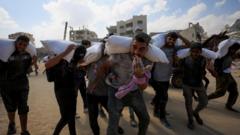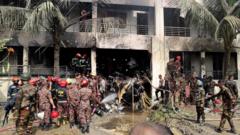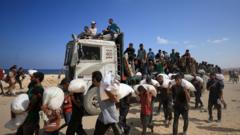In two recent incidents, Israeli soldiers are involved in deadly shootings that underscore the dire challenges of food distribution in Gaza amidst an ongoing humanitarian crisis.
Deadly Shootings Reflect Perils of Aid Efforts in Gaza

Deadly Shootings Reflect Perils of Aid Efforts in Gaza
The recent escalation of violence during aid distribution raises critical questions about the operational risks faced by humanitarian efforts.
Over the weekend, two tragic shootings shed light on the dangers inherent in delivering aid to Gaza’s desperate population. On Saturday, Israeli soldiers opened fire on Palestinians converging near food distribution sites that were organized by Israel-backed private contractors. The following day, gunfire erupted as people rushed toward a U.N. aid convoy also delivering food supplies.
Supporters of the Israel-backed distribution network utilized Sunday’s incident to criticize the United Nations' method, while advocates for U.N. aid highlighted the hazards associated with Israel's approach, underlining the inadequacies of both systems. Israel asserts that positioning aid distribution centers outside of Hamas-controlled regions minimizes potential theft by militants or looters. However, adversaries argue this strategy forces civilians into perilous situations by making them cross military lines.
Three overarching issues exacerbate the challenges related to these both methodologies. Firstly, during both incidents, the Israeli military opted to employ live ammunition to control flaring tensions rather than utilizing less lethal crowd management tactics. Moreover, the dire need for food compels civilians to risk their lives to avoid starvation in Gaza, where an Israeli blockade lasted a staggering 80 days earlier this year, drastically limiting access to resources.
Additionally, after nearly two years of ongoing conflict, most parts of Gaza are devoid of a functioning governing structure, leading to a vacuum in social services and law enforcement typically provided by Hamas. While Israel has significantly dismantled Hamas’s command and destroyed numerous government facilities, Prime Minister Benjamin Netanyahu has refrained from establishing a transitional governing body or empowering alternative Palestinian leaders to fill the void.
"The core issue remains the absence of governance," warns Shira Efron from the Israel Policy Forum, indicating that core governance challenges must be addressed to offer genuine solutions for Gaza’s future. Netanyahu maintains that Hamas must be completely neutralized before engaging in post-conflict planning. Critics, including some within Israel, argue that a comprehensive plan for governance is essential for effectively defeating Hamas.
Supporters of the Israel-backed distribution network utilized Sunday’s incident to criticize the United Nations' method, while advocates for U.N. aid highlighted the hazards associated with Israel's approach, underlining the inadequacies of both systems. Israel asserts that positioning aid distribution centers outside of Hamas-controlled regions minimizes potential theft by militants or looters. However, adversaries argue this strategy forces civilians into perilous situations by making them cross military lines.
Three overarching issues exacerbate the challenges related to these both methodologies. Firstly, during both incidents, the Israeli military opted to employ live ammunition to control flaring tensions rather than utilizing less lethal crowd management tactics. Moreover, the dire need for food compels civilians to risk their lives to avoid starvation in Gaza, where an Israeli blockade lasted a staggering 80 days earlier this year, drastically limiting access to resources.
Additionally, after nearly two years of ongoing conflict, most parts of Gaza are devoid of a functioning governing structure, leading to a vacuum in social services and law enforcement typically provided by Hamas. While Israel has significantly dismantled Hamas’s command and destroyed numerous government facilities, Prime Minister Benjamin Netanyahu has refrained from establishing a transitional governing body or empowering alternative Palestinian leaders to fill the void.
"The core issue remains the absence of governance," warns Shira Efron from the Israel Policy Forum, indicating that core governance challenges must be addressed to offer genuine solutions for Gaza’s future. Netanyahu maintains that Hamas must be completely neutralized before engaging in post-conflict planning. Critics, including some within Israel, argue that a comprehensive plan for governance is essential for effectively defeating Hamas.





















